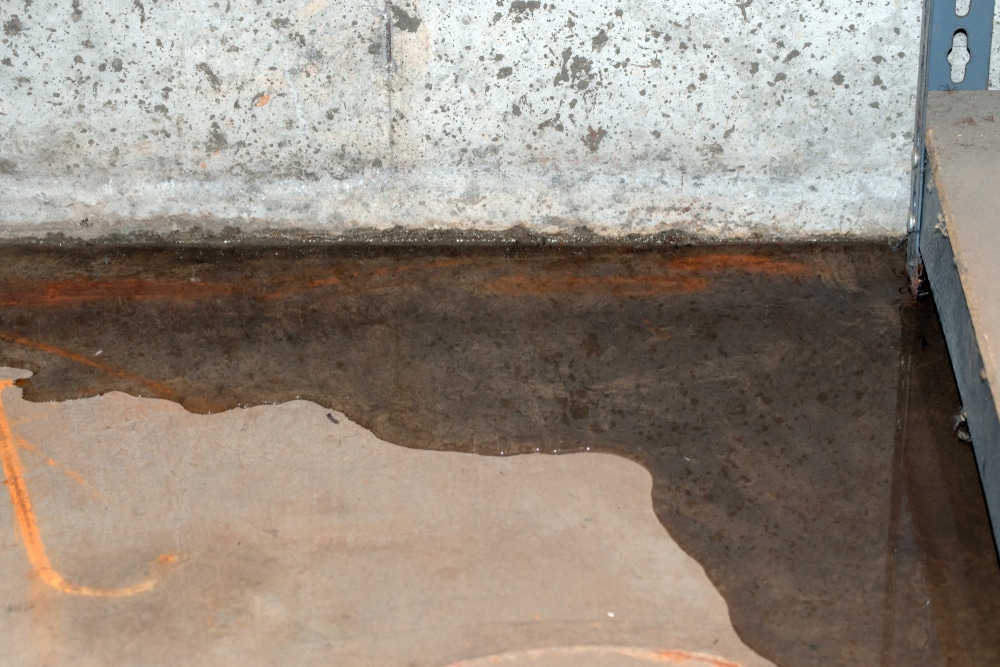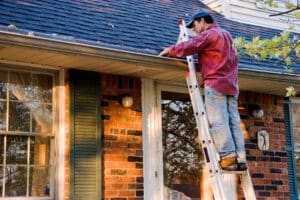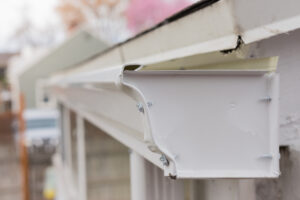If you find that water is leaking into your basement after heavy rain, you should first check for cracks in the interior and exterior walls, as they’re often the source of water leaks. Aside from foundation issues, there are a few other things that can cause basement water leaks and seepage, and most of them can be solved by preventing water from pooling around your home’s foundation in the first place.
Here are the common causes of water leaking into your basement after heavy rain and how to prevent it.
Common Causes of Basement Water Leakage
The most common cause of basement water damage is the pressure created by water in the soil around the foundation. If the perimeter of your home is often flooded with rainwater from clogged gutters or downspouts depositing water right next to your foundation, your basement will be susceptible to leaks and water seepage.
Here are the top three causes of basement water leakage.
The “Clay Bowl Effect”
This is the primary cause of basement leaks. When digging a foundation for a house, the soil is excavated, leaving a bowl-shaped area where the foundation sits. Some of this soil, called backfill, is put back after the foundation is constructed. This backfill soil absorbs more water than the untouched, hard-packed soil. When it rains, water collects around the foundation, and the loose soil becomes saturated; the moisture can enter your home through cracks in poured foundations, between blocks, or through the porous concrete. Water can also seep into the basement through the cove joint, which is where the basement wall and floor meet.
The “clay bowl effect” is especially common in regions that have soil with high clay content.
Hydrostatic & Lateral Pressure
When water builds up in the soil around the foundation, the denser soil and excess water puts pressure on the foundation. The pressure from the water, called hydrostatic pressure, can push moisture and water through the basement walls and floor. When the soil expands, it creates lateral pressure against the foundation. This can damage your home’s foundation and create leaks in your basement.
Window Wells
If window wells are improperly installed, or the drain becomes clogged, they can cause basement water leaks. During heavy rain, the well can fill with water, which then seeps into your basement. Water stains on your walls are signs of leaky basement windows.
Identifying Signs of Water Leakage in Your Basement
Leakage and seepage are the two main causes of wet basements, and there is a key difference between the two. Seepage is the movement of water through a porous material like water coming up through the basement floor. Leakage is the flow of water through an opening, like a broken pipe or a crack in the foundation.
Here are the signs of basement leaks and water seepage:
Leakage
- Cracks in concrete walls or between blocks of concrete
- Wetness on the wall or the floor below the crack
- Water intrusion below any windows
Seepage
- Efflorescence or white stains on the basement floor or walls, which are caused by salt deposits from the presence of moisture
Basement water issues can lead to mold growth, musty odors, and damage to your belongings and the structure of your home. Some signs, like a puddle on your basement floor or a musty odor, are obvious indicators of water leakage, but things like mold or rot that are hidden behind drywall or flooring in a finished basement are harder to detect. Fortunately, there are several things you can do to protect your foundation and basement from water damage.
Preventative Measures & Solutions
Ensure Proper Landscape Grading
The layout of your property should direct water to flow away from the home. The soil should have a positive grade, meaning that it slopes away from your home’s structure. A negative grade allows water to pool next to your basement walls and leak inside.
Maintain Gutters & Downspouts
Regular cleaning and maintenance of your gutters and downspouts is vital to prevent water leakage into your basement.
Install a Sump Pump
Sump pumps sit at the lowest part of your basement and gather and channel water away from your home. They work best when paired with an interior drainage system that collects water that leaks inside through the walls, floor, and cove joint.
Professional Solutions for Persistent Problems
Sealing Cracks in Foundation & Basement Walls
If there is water in your basement after rain, cracks in basement walls or your home’s foundation may be to blame. Cracks in the basement are commonly found in a few key areas:
- Interior walls, especially where corners meet and around doors and windows
- Exterior foundation walls
- Basement floor, particularly near drains
- Crawl spaces
- Where utility lines enter or exit foundation walls
Exterior foundation cracks need to be professionally repaired—crack sealant or waterproof paint won’t cut it, as they are not long-term solutions. Interior cracks also warrant a professional inspection, as they may be signs of a larger foundation problem.
Install a Drain Tile System/French Drain
A drain tile system or French drain is designed to redirect groundwater or excess surface water away from a home to prevent it from accumulating around foundations, basements, and crawl spaces. If you’ve already taken preventative measures and there is still water leakage in your basement, it may be a good idea to have a drain tile system installed. It can be interior or exterior.
Basement Waterproofing
If you’re dealing with persistent basement water problems, it’s best to contact a professional basement waterproofing to determine the source of the water leaks or seepage. If you have drainage issues in your yard, installing an exterior French drain might be an effective solution. If foundation cracks are the root of the problem, getting them filled and sealed may be the best option.
Install a Clog-Free Gutter System
Despite all of the ways you can waterproof your basement, they won’t be 100% effective if your gutter system is not properly redirecting water away from your home. Clogged gutters allow water to seep down the sides of your home, into interior walls and your basement.
Investing in a clog-free gutter system is a great way to prevent water from pooling around your foundation and basement in the first place.
Prevent Water in Your Basement With Gutter Solutions From Adam Vaillancourt Roofing
Gutter Shutter is a seamless, all-in-one gutter system that is guaranteed to never clog, sag, or pull away from your home. Its high-back design prevents water from seeping behind the gutters, and the rolled hood and integrated gutter guards keep water flowing while preventing clogs from leaves, twigs, and other debris.
Adam Vaillancourt Roofing is the exclusive dealer of Gutter Shutter in the Massachusetts and New Hampshire area, and our roofing and gutter technicians are factory-trained by Gutter Shutter for expert gutter installation and replacement.
If you’re experiencing water leaking into your basement after heavy rain from frequently clogged or ineffective gutters, consider switching to Gutter Shutter to protect your home from water damage.
Contact us to schedule your appointment today.




